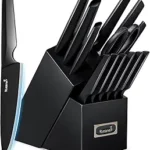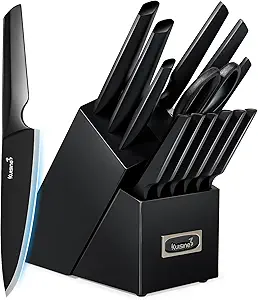what’s the benefits of an air fryer ?
Air fryers offer several benefits that make them a popular choice for cooking:
Health Benefits:
- Reduced Fat and Calories: Air fryers use hot air to cook food, requiring significantly less oil compared to traditional deep frying. This leads to a significant reduction in fat and calorie intake.
- Preserved Nutrients: The quick cooking time of air fryers helps preserve more of the food’s vitamins and minerals, making for healthier meals.
- Lower Acrylamide Levels: Air frying can lower the formation of acrylamide, a potential carcinogen that can form in starchy foods when cooked at high temperatures.
Convenience Benefits:
- Quick Cooking Times: Air fryers cook food faster than traditional ovens, saving you time in the kitchen.
- Easy Cleanup: The non-stick basket or tray in an air fryer is easy to clean, making for less post-cooking hassle.
- Versatile Cooking: Air fryers can be used to cook a variety of foods, including fries, chicken wings, vegetables, and even desserts.
Overall, air fryers offer a healthier and more convenient way to cook your favorite foods.
While air fryers offer many benefits, they also have some potential drawbacks:
1. Acrylamide Formation:
- High-temperature cooking methods, including air frying, can lead to the formation of acrylamide, a potential carcinogen.
- While air frying can reduce acrylamide formation compared to deep frying, it’s still important to be mindful of this.
2. Limited Capacity:
- Air fryers typically have a smaller capacity compared to ovens, which can limit the amount of food you can cook at once.
- This might be inconvenient for larger households or when cooking for a crowd.
3. Noise:
- Some air fryers can be quite noisy during operation, which might be bothersome for some people.
4. Potential for Uneven Cooking:
- Depending on the model and the type of food, air fryers may not always cook food evenly.
- This can result in some parts being overcooked while others are undercooked.
5. Limited Versatility:
- While air fryers can cook a variety of foods, they may not be as versatile as traditional ovens.
- Certain types of foods, such as baked goods or large roasts, may not be ideal for air frying.
It’s important to weigh these potential drawbacks against the benefits of air frying to determine if it’s the right cooking appliance for you.
Air Fryer vs. Oven: A Comparison
| Feature | Air Fryer | Oven |
|---|---|---|
| Cooking Method | Uses rapid air circulation to cook food | Uses radiant heat to cook food |
| Oil Usage | Requires minimal oil | Can require more oil, especially for frying |
| Cooking Time | Generally faster cooking times | Slower cooking times, especially for smaller quantities |
| Energy Efficiency | More energy-efficient due to faster cooking times and lower power consumption | Less energy-efficient, especially for small batches |
| Versatility | Limited to smaller portions and specific types of cooking | More versatile, can cook a wider range of dishes and larger quantities |
| Cleaning | Easier to clean due to fewer parts and non-stick surfaces | Can be more difficult to clean, especially after messy cooking |
| Space | Compact, countertop appliance | Larger, built-in appliance |
| Cost | Generally more affordable | More expensive, especially for high-end models |
Best Suited For:
- Air Fryer: Small portions, quick meals, crispy foods, and healthier alternatives to fried foods.
- Oven: Larger portions, baking, roasting, broiling, and multiple dishes at once.
Ultimately, the best choice depends on your specific needs and preferences. If you’re looking for a healthier, faster, and more convenient way to cook smaller portions, an air fryer is a great option. However, if you need to cook larger quantities or a wider variety of dishes, a traditional oven may be more suitable.



